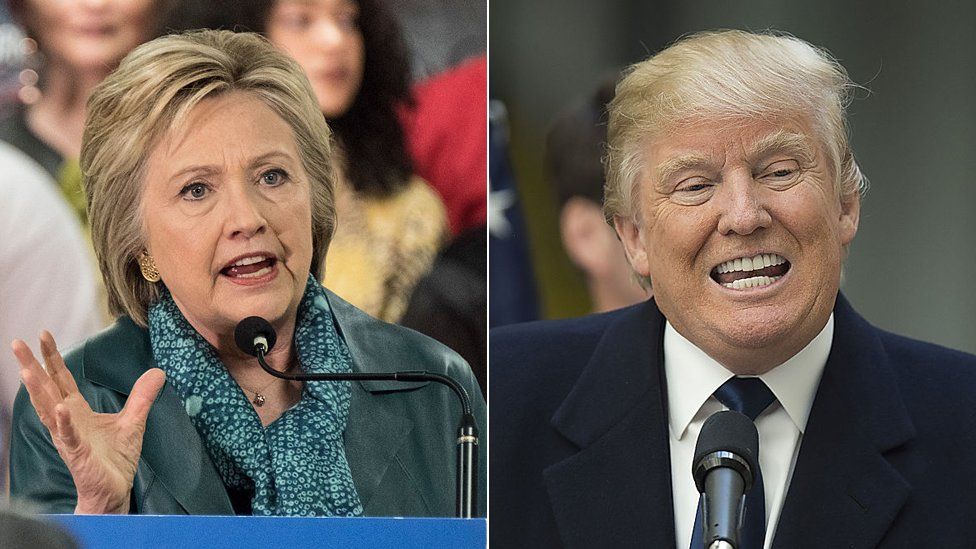US Election 2016: Trump and Clinton win big in Arizona
- Published

US presidential front-runners, Democrat Hillary Clinton and Republican Donald Trump, have continued their winning streaks, taking Arizona.
The issue of immigration loomed large in the south-western state, the biggest prize in the latest round of contests.
Polls showed that Mr Trump's anti-immigration message resonated with the state's conservative voters.
With Arizona's growing Latino population, Mrs Clinton continued her success by courting minority voters.
Keeping his campaign in the race, Democrat Bernie Sanders decisively won caucuses in two smaller states, Idaho and Utah.
The Utah Republican caucuses were won by Texas Senator Ted Cruz.
He also received a welcome boost with the endorsement of former Florida governor Jeb Bush, who pulled out of the race last month.
Analysis: Anthony Zurcher, BBC News North America Reporter
Hillary Clinton and Donald Trump effectively held serve in Tuesday's slate of primaries and caucuses. Both posted sizable wins in Arizona, which - thanks to the state's population - balanced out losses elsewhere.
For Mr Trump to have a realistic path to securing the Republican nomination before the party's convention he needed Arizona's winner-take-all primary. The state proved to be fertile territory for the front-runner's anti-immigration, border-security pitch.
Mr Trump is still on pace to near the magic delegate number of 1,237. Unless momentum changes significantly, it's going to be a nail-biter.
The New Yorker's Utah loss was notable for its size, denying him any delegates there and proving that while Mr Trump has broad appeal among Republicans, that does not extend to the state's sizeable Mormon population.
There's only one Utah, however, and many more states ahead that could be friendlier to Mr Trump.
Mrs Clinton's comfortable win over Bernie Sanders in Arizona was more surprising, as the Vermont senator had invested considerable resources there. He dominated the smaller Utah and Idaho caucuses, however - offering further proof of his appeal in states with a less diverse voter pool.
Mr Sanders made little, if any, headway in the delegate count, however. He needs more big wins, without setbacks like Arizona - and soon.
During a victory speech in Seattle, Mrs Clinton addressed the terrorist attacks in Brussels on Tuesday, pushing back against the Republican candidates' response to the bombings.
Earlier on Tuesday, Mr Trump reiterated his plan to ban Muslims from travelling to the US and suggested that the US should torture terrorism suspects.
"We live in a complex and dangerous world," Mrs Clinton said. "And we need a commander-in-chief that can provide leadership that is strong, smart and above all steady in taking on these threats.
The last thing we need are leaders who incite more fear," she said, alluding to Mr Trump.
The Republican primary in Arizona was a winner-take-all race, adding 58 delegates to Mr Trump's sizable lead.
What do Mexicans think of Donald Trump?
Primary results 22 March - Complete results from Arizona, Idaho and Utah
Trump struggles to win over Mormons - Unlike other religious groups, Mormons aren't sold on the front-runner
Who is funding the US election? - Money is a big issue in the 2016 US presidential race
Could Hillary Clinton face jail time? - The case of David Petraeus may signal how she will fare
The property tycoon's win complicates efforts by Mr Cruz and Ohio Governor John Kasich to stop him from securing a majority of delegates.
If Mr Trump falls short in the delegate count, the party could hold a brokered or contested convention where party leaders, not voters, choose the nominee.
However, that scenario is looking less likely as Mr Trump continues to win states.
Arizona residents' preference for early voting, with many mailing in their ballots, may have affected the race.
Florida Senator Marco Rubio, who left the race on 15 March, secured more than 70,000 votes.
As the final voters headed to the polls on Tuesday, the Republican race took another nasty turn.
Mistakenly believing the Cruz campaign had produced an attack advert about his wife Melania, Mr Trump on Twitter threatened to "spill the beans" on Mr Cruz's wife, Heidi.
Mr Cruz responded saying his campaign did not produce the advert, calling Mr Trump "classless" and a "coward".